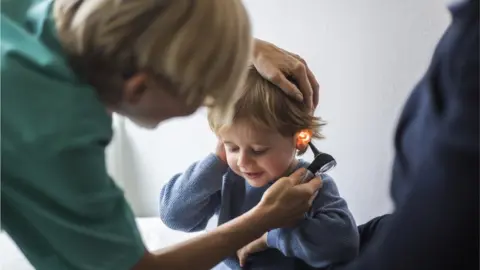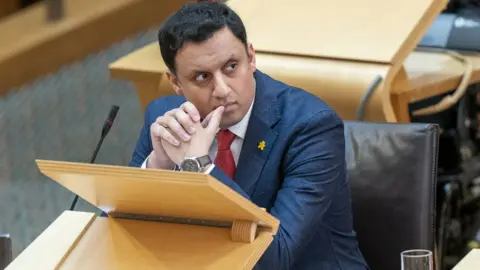Children face 'catastrophic' wait for NHS treatment
 Getty Images
Getty ImagesA report has warned that children's health is being put at risk by lengthy waits for NHS treatment.
The Royal College of Paediatrics and Child Health (RCPCH) said the number of children waiting for some services had more than doubled in the past 11 years.
RCPCH Scotland's Dr Mairi Stark called the data "shocking" and said long waits could be "catastrophic" for children.
She said there had been a "clear failure" to prioritise child health.
First Minister Humza Yousaf denied that the Scottish government was failing children, and said that progress was being made on reducing the length of time children have to wait.
He said data from April to December 2023 showed the paediatric new outpatients list had reduced by 21%, while waits of more than 52 weeks reduced by 12% and 78 weeks by 31%.
Dr Stark said she had "witnessed a general decline in the wellbeing of children and young people" during her time as a paediatrician.
She added: "Lengthy waits are unacceptable for any patient, but for children and young people the waits can be catastrophic, as many treatments need to be given by a specific age or developmental stage.
"It is not the same as for adults: if you miss the right window to treat a child or wait too long the consequences can be irreversible."
The RCPCH report found that in October 2012, the number of children waiting for care was 4,898. By September 2023 - the latest available data - it was more than 10,512.
However, the most recent figure was lower than the peak of 13,138 in July 2022.
 PA Media
PA MediaThe RCPCH also found that the percentage of children waiting longer than 12 weeks had risen from 1% of all cases in 2012 to 49% last year.
The figures excluded surgical, cardiology, mental health and ear, nose and throat treatments - which Dr Stark said meant they were likely "the very tip of the iceberg" as there were also "exceptionally long waits" for many of these services.
The report stated: "Our members tell us that over the past 11 years, pressures on services and staff have greatly increased and this has resulted in a greater number of children and young people waiting for longer periods."
Among its recommendations was a full review of the child health workforce.
It said paediatric services must be a priority for the Scottish government if significant improvements were to be made.
A spokesperson for the Scottish government said: "The significant impact of Covid-19 on the normal operation of the NHS cannot be underestimated but we are pleased that paediatric waiting times are going in the right direction.
"Since 2014 we have added 43 additional speciality training posts to paediatrics and our workforce will be integral to our continued efforts to reduce waiting times."
The report was raised at first minister's questions by Scottish Labour leader Anas Sarwar, who said he had been contacted by the mother of a three-year-old boy who had repeatedly been diagnosed with tonsillitis that made it difficult for him to eat, drink and even breathe.
Mr Sarwar said: "She told me that she has to lie awake next to him during the night because his breathing stops and she has to nudge him to restart his breathing.
"She had to fight to get Cody referred to a specialist but has been told an urgent referral for treatment will take three years."
Mr Sarwar said the boy's mother had to make the "difficult decision" to go private, and had borrowed almost £5,000 from her family to pay for treatment.
Scottish Conservative health spokesman Dr Sandesh Gulhane said the report would "alarm any parent who wants to know that their child will not be suffering excess delays in Scotland's NHS".
He added: ""Successive health secretaries have failed to act and waiting times at children's hospitals have spiralled over the last decade as a result."
